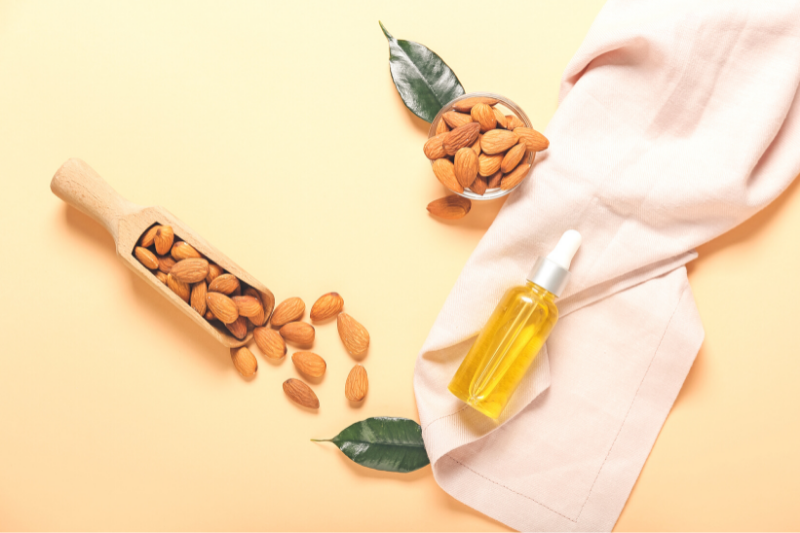Have you ever wondered, is almond oil non-comedogenic? If you’re prone to acne breakouts, then you know how frustrating it is to find products that won’t make your acne worse.
Maybe you’ve heard of almond oil and how it can be helpful for clearing acne. Is this true? Can almond oil get rid of your acne, or will it make it worse?
Below, I cover everything you need to know about almond oil and acne including whether almond oil can help acne or make it worse and how exactly to use almond oil on your skin for the best results.

What Is Almond Oil?

We classify almonds as “tree nuts”, but they aren’t actually nuts at all. They’re seeds. They come from the fruit of the almond tree, or Prunus dulcis.
The most common way that we use almonds is for snacking and eating. Many people love a good almond because they pack a nice crunch, and they’re incredibly healthy for you. Still, there are other ways to use almonds, such as in the skin or hair.
In fact, people have been using almond oil for centuries because it is so good for the skin.
There are two different kinds of almond oil that you can use: refined and unrefined.
Refined Vs Unrefined Almond Oil
Extraction of refined oil occurs using harsh chemicals and exposure to high heat. You’re most likely to find refined oil in cooking products and in pre-made beauty products.
This is because it is easier and cheaper to make. Refined oil also lasts longer, and it’s easier to cook with. Refined almond oil is resistant to high temperatures, making it safer to cook with.
Still, refined oil isn’t the best to use. The harsh way in which it’s extracted leaves it devoid of most of its nutrients.
Unrefined almond oil is better for your health because extraction occurs naturally. Because it’s not exposed to high heat or chemicals, it retains all its nutrients.
What Does Comedogenic Mean?
When you think of something that’s comedogenic, you’re going to think of something that clogs pores. If you’re prone to acne, you won’t want to use a comedogenic product because clogged pores lead to acne breakouts.
Not all products clog pores, of course. Ingredients that don’t clog pores are “non-comedogenic”. So, how do you tell if something is comedogenic or non-comedogenic?
It depends on the ingredients in the product. Some ingredients are more prone to clogging than others.
Researchers first analyze which ingredients are in a product. Then they determine how likely a product is to clog pores. Based on this information, they place the product on the “comedogenic scale”.
The comedogenic scale rates products from 0-5. Products rated 0-2 are non-comedogenic, while products rated 4-5 are very comedogenic.
As a quick guide, here is a short list of comedogenic products that you should steer clear of:
- Carrot Seed Oil
- Cocoa Butter
- Coconut Oil
- Flax Seed Oil
- Oleic Acid
- Palm Oil
- Soybean Oil
- Wheat Germ Oil
Is Almond Oil Comedogenic? Does Almond Oil Clog Pores?

Some people fear that almond oil is comedogenic, so they’re afraid to use it. Yet, the almond oil comedogenic rating is “2”. This means that there is the potential that almond oil may clog your pores, but the possibility is very low.
Almond oil receives the rating of “2” because it contains oleic acid which clogs pores. Oleic acids make up about 62-86% of the total ingredients in almond oil.
Still, it also contains 20-30% linoleic acid which is non-comedogenic. In other words, the two oils cancel each other out.
Still, there is more oleic acid than linoleic acid, which is why almond oil has a rating of “2” rather than “0”.
As I mentioned, it’s not likely for almond oil to clog your pores, but the possibility is there. If your skin is acne-prone, try castor oil which has a comedogenic rating of “0”.
Is Sweet Almond Oil Comedogenic?
What’s the difference between almond oil and sweet almond oil? The answer is simple. Sweet almond oil is made with sweet almonds, while “bitter” almond oil is made with bitter almonds.
When something is simply called “almond oil”, it could be either type, although it is usually sweet almond oil which is more common.
Is sweet almond oil non-comedogenic? The answer is no. Bitter almonds and sweet almonds have the same comedogenic rating. So, the sweet almond oil comedogenic rating is “2”.
Does Almond Oil Clear Acne?
Acne is often a symptom of oily skin. Our bodies produce an oil called “sebum”. Sebum is good for us because it keeps our skin hydrated and moisturized. But, some people overproduce sebum which leads to oily skin.
Almond oil contains fatty acids that work to break down sebum. When sebum no longer clogs your pores, you are less likely to experience acne. With the clearing of sebum, it’s possible that almond oil may clear the acne already present in your body.
Also, almond oil contains retinoids which reduce the appearance of acne. It heals damaged skin cells while encouraging the production of new skin cells.
Should You Use Almond Oil On Your Skin?

Almond oil is helpful for most skin types, so it’s likely that it’ll work for you. There are a few things to consider, though. Below, I’ve included the benefits of using almond oil as well as some precautions that you should take.
Almond Oil Has Anti-Inflammatory Properties
When you use almond oil, it can reduce swelling of the skin. This makes it useful for a variety of products.
This is a good characteristic to have for acne-prone skin because acne causes your face to swell. Acne occurs because of a bacterial infection in the skin. So, your skin will become inflamed and irritated. The anti-inflammatory properties of almond oil can ease those symptoms.
Its anti-inflammatory properties can help with swelling in the rest of the body, too. Those with aging skin may experience puffiness under their eyes. Those with wounds on their body will also experience swelling. Reduction of this swelling will occur with the use of almond oil.
Almond Oil Is Moisturizing
People have been using almond oil for centuries to moisturize their skin. Almond oil is an emollient which means that it pulls moisture from the air and locks it into the skin. It is even gentle enough to help with skin conditions like eczema and psoriasis.
Almond Oil Improves The Appearance Of Your Skin
Hydrated skin is going to look and feel better. The moisturizing properties of almond oil can make your skin look more vibrant. It can reduce the appearance of hyperpigmentation.
Almond Oil Promotes Healing
Almond oil heals damaged skin whether it be from a wound, dry skin, or sun damage. It also aids in the production of new skin cells to replace the damaged ones.
This is due to the presence of vitamin E in the skin which acts to promote healing.
Almond Oil Reduces The Appearance Of Scars & Stretch Marks
Likewise, vitamin E prevents scars and reduces their appearance. Scars appear when damage occurs to the skin. This can come in the form of acne scars, wound scars, or even stretch marks.
If you use almond oil regularly, the vitamin E can prevent scars from ever occurring. Yet, if you have scars that you’d like to get rid of, almond oil can help with that too.
There is no promise that almond oil will get rid of your scars for good, but it can help to fade them. Vitamin E works to repair the damaged skin cells and produce new, healthy cells. This can help reduce the appearance of scars.
Almond Oil Allergies
Whenever trying out a new oil, you should always take caution. This is especially important with almond oil since so many people have an allergy to almonds.
If you are allergic to almonds or any kind of tree nut, DO NOT use almond oil.
Even if you don’t think you’re allergic to almonds, take caution. You could be allergic and not be aware of it.
To be safe, you should perform a patch test. Simply massage a few drops of oil into your inner elbow and cover it with a bandaid for 24 hours. Remove the bandage the next day, and if your skin hasn’t had a reaction, then it’s safe to use.
Conclusion
Almond oil is non-comedogenic with a rating of “2” on the comedogenic scale. With that said, there is still a chance that it may cause your pores to clog if you’re particularly acne-prone. Take caution, but give almond oil a chance. You might find that almond oil works wonders on your face.
Discover more wonderful ways to use almond oil for skin, eyes, beard, scars, cooking and dogs. Find all our guides to almond-based products here.

![Is Almond Oil Comedogenic? Does It Clog Pores? [Full Guide] is almond oil comedogenic](https://eatquickhealthy.com/wp-content/uploads/2022/05/is-almond-oil-comedogenic-768x512.png)

Comments are closed.